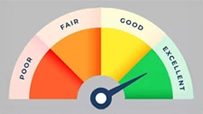Consider These Do’s and Don’t Before Applying for a Home Loan
September 01, 2025

A home loan is a long-term commitment that requires careful planning and financial prudence. Making informed decisions before applying for a home loan can save you from unnecessary financial strain in the future. To help you navigate this crucial process, we have compiled a list of do's and don'ts that will set you on the right path to homeownership.
The Do’s Before Applying for a Home Loan
1. Check Your Credit Score
Your credit score plays a crucial role in determining your home loan eligibility and interest rate. A higher credit score (750 and above) increases your chances of securing a loan at a lower interest rate. Obtain your credit report and rectify any discrepancies before applying. You can still get a home loan with low CIBIL score, but the interest rate offered could be higher than advertised rates.
2. Assess Your Loan Eligibility
Lenders consider various factors such as income, existing debts, age, and employment stability to determine your loan eligibility. Use online home loan eligibility calculators to get an estimate of how much you can borrow.
3. Compare Interest Rates and Loan Offers
Different banks and financial institutions offer varying interest rates and loan terms. Compare offers to find the most suitable loan based on interest rates, processing fees, prepayment charges, and tenure.
4. Determine Your Budget and EMI Affordability
Before applying for a home loan, analyse your monthly expenses and determine a comfortable EMI amount. A home loan EMI should ideally not exceed 40% of your net monthly income.
5. Save for a Higher Down Payment
Banks generally finance up to 75-85% of the property’s value, requiring you to arrange the remaining amount as a down payment. A higher down payment reduces the loan amount and interest burden.
6. Check the Loan Tenure
Opting for a shorter loan tenure results in higher EMIs but reduces the total interest outgo. If affordability is a concern, a longer tenure will lower your EMIs but increase the overall interest paid.
7. Gather Necessary Documents
Ensure you have all the required documents, including income proof, employment details, property papers, and identity proofs. This can speed up the approval process and avoid unnecessary delays.
8. Consider Additional Costs
Apart from the loan amount, factor in extra costs like registration fees, stamp duty, home insurance, and maintenance charges. Being prepared for these expenses prevents last-minute financial stress.
9. Understand Loan Terms and Conditions
Carefully read the loan agreement, including clauses related to prepayment, foreclosure, and hidden charges. Seek clarifications on any ambiguous terms before signing the contract.
10. Get Pre-Approved for a Loan
A pre-approved home loan gives you an edge in negotiations with sellers and speeds up the final approval process when you finalize the property.
The Don’ts Before Applying for a Home Loan
1. Don’t Apply Without Checking Your Credit Report
Applying with a low credit score may lead to rejection or high-interest rates. Always review your credit report and improve your score, if necessary, before submitting your application.
2. Don’t Make Multiple Loan Applications Simultaneously
Submitting multiple loan applications to different lenders within a short span can negatively impact your credit score and indicate financial distress.
3. Don’t Overestimate Your Repayment Capacity
Borrow only what you can comfortably repay. Stretching your budget too thin can lead to financial stress and a risk of default.
4. Don’t Switch Jobs Before or During the Loan Application
Lenders prefer stability in employment. A job switch before or during the loan process may affect your approval chances.
5. Don’t Underestimate the Importance of a Co-Applicant
If your income is insufficient, adding a co-applicant (spouse, parent, or sibling) can enhance your eligibility and improve loan terms.
6. Don’t Ignore Floating vs Fixed Interest Rate Comparison
Understand the pros and cons of both types of interest rates. A fixed rate offers stability, while a floating rate can benefit you in a declining interest rate scenario.
7. Don’t Forget to Maintain a Healthy Debt-to-Income Ratio
Lenders prefer a debt-to-income ratio below 40%. Avoid taking on additional loans or credit card debt before applying for a home loan.
8. Don’t Choose a Lender Based Solely on Low Interest Rates
A lower interest rate is important, but also consider factors like service quality, prepayment charges, processing fees, and overall customer experience.
9. Don’t Overlook the Fine Print
Hidden charges, penalty clauses, and prepayment conditions can impact your finances. Always review the terms and conditions carefully.
10. Don’t Delay Loan Repayments or Default on Existing Loans
Your repayment history significantly impacts your loan eligibility. Ensure timely payments of existing EMIs to maintain a strong financial record.
Final Thoughts
Applying for a home loan is a crucial financial decision that requires careful planning and informed choices. By following these do’s and don’ts, you can enhance your chances of loan approval, secure better terms, and enjoy a hassle-free home-buying experience.
Buying a house has never been this easy! Avail Ujjivan SFB’s wide range of affordable home loan products and enjoy a hassle-free loan journey. From house purchase loan to plot loans and home improvement loans, we have it all! Alternatively, you can browse through Ujjivan SFB product suite - our wide range of financial products are designed to make your financial life better.
Disclaimer:
The contents herein are only for informational purposes and generic in nature. The content does not amount to an offer, invitation or solicitation of any kind to buy or sell, and are not intended to create any legal rights or obligations. This information is subject to updation, completion, amendment and verification without notice. The contents herein are also subject to other product-specific terms and conditions, as well as any applicable third-party terms and conditions, for which Ujjivan Small Finance Bank assumes no responsibility or liability.
Nothing contained herein is intended to constitute financial, investment, legal, tax, or any other professional advice or opinion. Please obtain professional advice before making investment or any other decisions. Any investment decisions that may be made by the you shall be at your own sole discretion, independent analysis and evaluation of the risks involved. The use of any information set out in this document is entirely at the user’s own risk. Ujjivan Small Finance Bank Limited makes no representation or warranty, express or implied, as to the accuracy and completeness for any information herein. The Bank disclaims any and all liability for any loss or damage (direct, indirect, consequential, or otherwise) incurred by you due to use of or due to investment, product application decisions made by you on the basis of the contents herein. While the information is prepared in good faith from sources deemed reliable (including public sources), the Bank disclaims any liability with respect to accuracy of information or any error or omission or any loss or damage incurred by anyone in reliance on the contents herein, in any manner whatsoever.
To know more about Ujjivan Small Finance Bank Products Visit:"https://www.ujjivansfb.in"
All intellectual property rights, including copyrights, trademarks, and other proprietary rights, pertaining to the content and materials displayed herein, belong
to Ujjivan Small Finance Bank Limited or its licensors. Unauthorised use or misuse of any intellectual property, or other content displayed herein is strictly prohibited and the same is not intended for distribution to, or use by, any person in any jurisdiction where such distribution or use would (by reason of that person’s nationality, residence or otherwise) be contrary to law or registration or would subject Ujjivan Small Finance Bank Limited or its affiliates to any licensing or registration requirements.
FAQs
1. What is the ideal credit score for a home loan in India?
A credit score of 750 and above is considered ideal for securing a home loan with favourable interest rates.
2. How much down payment is required for a home loan?
Most lenders require a down payment of 10-25% of the property value, depending on the loan amount and eligibility.
3. How can I increase my home loan eligibility?
You can increase your eligibility by maintaining a high credit score, adding a co-applicant, reducing existing debts, and opting for a longer tenure.
4. What documents are required for a home loan?
Documents required include identity proof, address proof, income proof (salary slips or ITR), employment details, and property documents.
5. What is the difference between fixed and floating interest rates?
A fixed rate remains constant throughout the tenure, while a floating rate fluctuates based on market conditions.
6. Can I prepay my home loan? Are there any charges?
Yes, you can prepay your home loan. Some banks charge prepayment penalties, especially for fixed-rate loans.
7. What is a home loan processing fee?
A processing fee is a one-time charge levied by the lender for processing your loan application, typically ranging from 0.5% to 2% of the loan amount.
8. Is home loan insurance mandatory?
Home loan insurance is not mandatory but is recommended to protect your family from financial burden in case of unforeseen circumstances.
9. How long does it take for a home loan to be approved?
Home loan approval typically takes 7-15 working days, depending on document verification and lender policies.
10. Can I transfer my home loan to another bank for a lower interest rate?
Yes, you can opt for a home loan balance transfer to another lender offering lower interest rates, but consider processing fees and transfer charges before proceeding.
Latest Blogs

Credit Score Not Improving? 5 Mistakes You Might Be Making
August 13, 2025
For most of us, a credit score feels like a silent judge sitting in the background of our financial lives.

Banking Jargon Decoded: 15 Key Terms You Should Know
May 13, 2025
Banking feels simple on the surface; deposit money, withdraw when needed, pay bills, or transfer funds.

The ₹10 Lakh Rule for Cash Deposit Explained
August 13, 2025
Every day, millions of Indians walk into their banks to deposit cash, sometimes a few thousand rupees, sometimes several lakhs.

Missed Income or Errors? Here’s How ITR-U Can Save You from Penalties
August 13, 2025
Less than three weeks remain before the September 15 deadline to update income tax returns.

This Current Account is Designed to Empower Your Business
June 16, 2025
In the fast-paced world of business, having the right bank account can be a game-changer.





